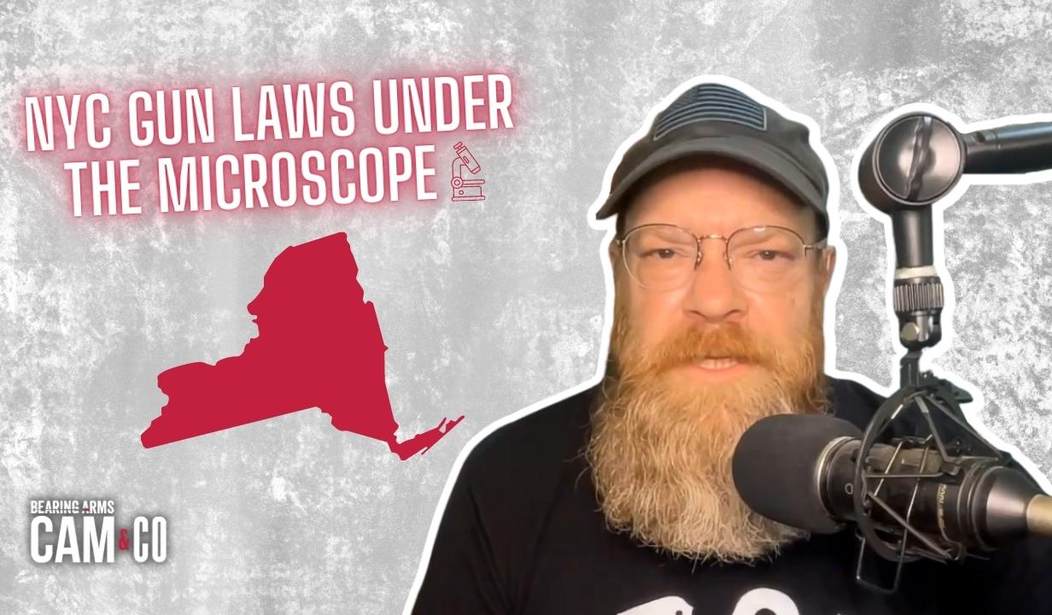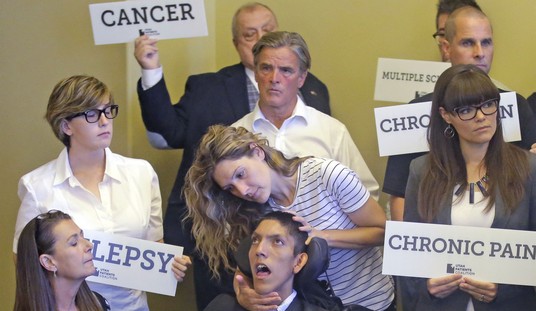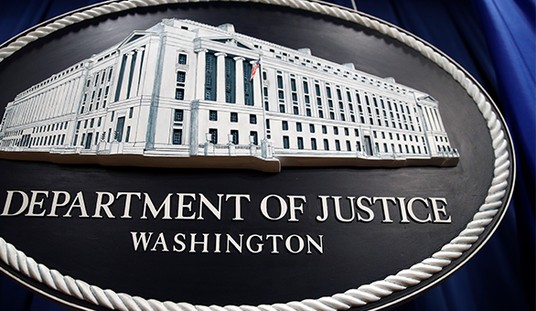While the New York man who shot an alleged mugger in Queens early Wednesday morning isn’t facing any formal charges in connection with the shooting (at least, not yet), Queens D.A. Melinda Katz has charged 65-year-old Charles Foehner with more than two dozen felony counts of illegal gun possession for having unregistered long guns and handguns in his home… as well as having one on his person when he shot and killed 32-year-old Cody Gonzalez.
On today’s Bearing Arms’ Cam & Co we’re taking a closer look at the city’s ridiculous restrictions on the right to keep and bear arms, and I’m glad that attorney Peter Tilem could join the show with his insight and experience as both a prosecutor and defense attorney.
As Peter notes, crazy as it sounds, in New York City gun owners must not only have a specific license for every firearm in their possession, they must also separately register those guns with the government. According to authorities Foehner was in legal possession of six of the 30 guns in his home, but did not have the proper paperwork for seventeen handguns and another eight long guns. Even though Foehner isn’t prohibited by law from owning a firearm and in the vast majority of states would not be required to register them or obtain a separate license for each gun, thanks to New York’s anti-Second Amendment statutes he could be looking at years in prison for a mere possessory offense.
Tilem tells Bearing Arms that the draconian licensing laws, combined with the lengthy delays in processing permit applications that he’s challenging in court, has led to a number of New Yorkers simply throwing up their hands in frustration and choosing to keep a gun in their home or on their person in violation of the city and state statutes. Better to be judged by twelve than carried by six, as the saying goes, and Tilem says he’s handled plenty of cases where gun owners have made that choice because the licensing and permitting process is so cumbersome and drawn out.
As for Foehner’s case specifically, Tilem (who is not representing Foehner) says it’s not uncommon for Katz’s office to pile on every charge possible and then offer a plea deal to one or two of the counts, but he’s not convinced that a grand jury will even indict the Queens resident for possessing much of his gun collection without the proper paperwork mandated by the city and state. In fact, he tells Bearing Arms that he’s handled multiple cases where grand juries have returned a “no bill” to similar charges after the defendant honestly and forthrightly explained why they possessed a firearm, and given the circumstances of Foehner’s arrest he believes that’s a district possibility here as well.
Tilem added that if a grand jury does return an indictment, Foehner’s attorneys could raise a constitutional challenge to the licensing and registration laws he’s accused of violating. There are just six states (and the District of Columbia) that require firearm registration, so these are hardly longstanding and widespread regulations, but even if a court were to uphold gun registration and licensing in theory, Tilem believes that it would still be possible to challenge the current licensing and registration scheme in New York City because of its peculiarities. In Bruen, the court upheld the constitutionality of “shall issue” licensing regimes for concealed carry, but noted that “we do not rule out constitutional challenges to shall-issue regimes where, for example, lengthy wait times in processing license applications or exorbitant fees deny ordinary citizens their right to public carry.”
As Tilem points out, New York City is supposed to process licensing and registration applications within six months (already an interminable time to wait before you can exercise your fundamental right to keep and bear arms), but the city is routinely taking well over a year to get back to many applicants. In Meissner v. City of New York, Tilem’s clients contend that the city has delayed processing their own applications for as long as 14 months, though Tilem wryly noted that the named plaintiff was magically approved to bring his lawfully-owned firearm from his former home in New Jersey to his current residence in the city just a week after the lawsuit was filed.
The unreasonable length of time it takes for the city to approve these licensing and registration applications calls the constitutionality of the entire scheme into question, in other words, and Foehner’s attorneys don’t have to wait for any post-conviction relief to raise a constitutional challenge to the statutes their client is accused of violating. Is it “reasonable” or “common sense” (to use two of the gun control lobby’s favorite buzzwords) to send a 65-year-old man to prison because only some of his firearms were registered? I certainly don’t think so, but we’ll see soon enough what a grand jury has to say. If they do end up indicting Foehner on some or all of these possessory offenses, this case could end up being a wrecking ball to New York’s registration laws. Will Katz run that risk, or will she end up offering Foehner a plea deal in his favor to make the case go away? Time will tell, and we’ll be following the next steps in Foehner’s prosecution very closely.
Be sure to check out the entire conversation with Peter Tilem in the video window below. I appreciate his insight and expertise on the subject at hand, and I think you will as well.









Join the conversation as a VIP Member